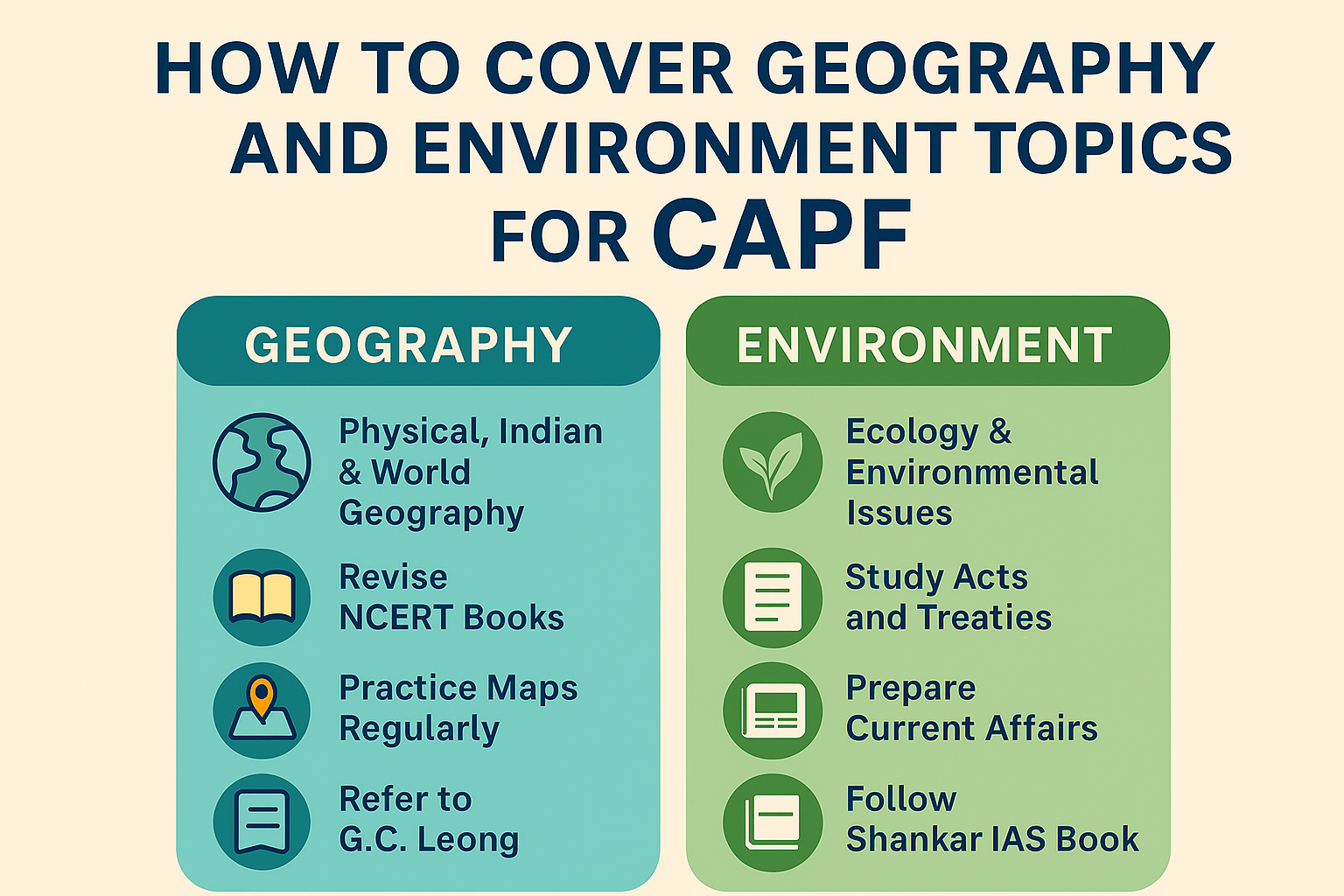Introduction
The CAPF AC Exam, conducted by UPSC, is one of the most prestigious exams for Assistant Commandants. Among the subjects in Paper I (General Ability & Intelligence), Geography and Environment hold significant weightage.
Questions come from both static concepts (NCERT Geography) and dynamic issues (climate change, biodiversity, policies). With proper preparation, aspirants can turn these subjects into high-scoring areas.
This article will guide you on how to cover Geography and Environment topics for CAPF, with effective tips and insights into how Victor Growth Coaching helps aspirants.
Importance of Geography & Environment in CAPF
Weightage: Around 20–25 questions in Paper I come from Geography and Environment combined.
Static + Dynamic Nature: Requires conceptual clarity and awareness of current environmental issues.
Overlap: Topics also help in Current Affairs, Essay writing (Paper II), and Interview.
Officer Relevance: As a CAPF officer, awareness of environmental challenges, natural disasters, and resource distribution is essential.
Booklist for Geography & Environment (CAPF Exam)
NCERT Geography (Class 6–12) – Must for basics.
Certificate Physical and Human Geography – G.C. Leong.
Oxford Student Atlas (India & World).
Environment by Shankar IAS Academy.
Current Affairs Sources – The Hindu, Indian Express, PIB, Down to Earth magazine.
Strategy to Cover Geography for CAPF
1. Physical Geography
Landforms, rocks, volcanism, earthquakes, climatology, ocean currents.
Practice diagrams and maps for better recall.
2. Indian Geography
Physiography, rivers, monsoons, soils, agriculture, industries.
Focus on economic geography like mineral distribution, energy resources.
3. World Geography
Continents, oceans, important climatic regions, natural resources.
Map-based practice → location of countries, seas, and key features.
4. Map Practice
Daily 15-minute map practice using an Atlas.
Mark rivers, mountains, and important places from news.
Strategy to Cover Environment for CAPF
1. Ecology & Basics
Ecosystem, food chain, energy flow, biomes.
Biodiversity concepts and hotspots in India.
2. Environmental Issues
Climate change, pollution, waste management, renewable energy.
Environmental movements and NGOs in India.
3. National & International Policies
Environment Protection Act, Wildlife Protection Act, Forest Rights Act.
International treaties: Kyoto Protocol, Paris Agreement, COP summits.
4. Current Affairs in Environment
Focus on government schemes (e.g., NAMAMI Gange, National Solar Mission).
Regularly update with latest reports (IPCC, UNEP).
Practical Tips for Geography & Environment Preparation
Integrate Static + Current Affairs → e.g., Read about monsoons + IMD’s latest report.
Revise NCERTs multiple times → They form the backbone of GS preparation.
Use Diagrams & Maps → Visual memory improves accuracy.
Make Short Notes → For treaties, environmental acts, and hotspots.
Practice PYQs → Many CAPF questions are repeated with slight changes.
Take Mock Tests → To improve speed and application of concepts.
How Victor Growth Coaching Helps in Geography & Environment Preparation
At Victor Growth Coaching, we provide targeted support for these subjects:
✅ Structured Classes → Covering NCERTs, G.C. Leong, and Shankar IAS systematically.
✅ Map-Based Learning → Daily practice of Indian and World maps.
✅ Current Affairs Integration → Linking Geography & Environment with daily news.
✅ Exclusive Notes → Concise summaries of environmental acts and treaties.
✅ Mock Tests & Quizzes → To strengthen conceptual clarity and application.
✅ Essay Training → Topics like climate change, disaster management, and resource security.
✅ Affordable Fee Structure → Making quality coaching accessible to all aspirants.
SEO Keywords
CAPF Geography preparation strategy
Environment preparation tips for CAPF exam
Best book for Geography & Environment CAPF
CAPF 2026 exam preparation
Victor Growth CAPF coaching
FAQs on Geography & Environment for CAPF
Q1. How many questions are asked from Geography & Environment in CAPF?
Around 20–25 questions combined, making it highly important.
Q2. Which NCERTs are most important for Geography?
Class 9–12 NCERTs, especially Fundamentals of Physical Geography and India: Physical Environment.
Q3. Is G.C. Leong necessary for CAPF?
Yes. It helps in Physical and World Geography concepts.
Q4. How should I prepare Environment?
Cover basics from Shankar IAS book + update with current affairs and government schemes.
Q5. How much time should I dedicate daily to Geography & Environment?
1.5–2 hours daily with weekly map practice.
Q6. Does Victor Growth provide notes for Environment?
Yes. Victor Growth offers concise notes on ecology, policies, and treaties.
Q7. Are diagrams and maps important for CAPF Geography?
Yes. Map-based questions are common, and diagrams aid better retention.






